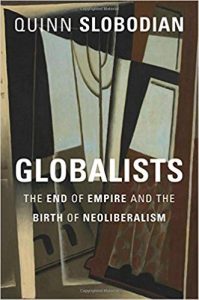A while ago I had one of those brilliant dinners when you sit next to someone new and strike up a fascinating conversation. The occasion was the dinner celebrating honorary graduands of Bristol University (a boast – I had the honour of being awarded an honorary degree there this year), and Prof Paddy Ireland, my neighbour at the table, recommended in the course of a fab two-hour conversation, Globalists: The end of empire and the birth of neoliberalism by Quinn Slobodian.
It is indeed a deeply interesting book, a history of what Slobodian terms the Geneva neoliberals – those, including Hayek, who were globalists avant la lettre because they looked back with nostalgia to their youth in the Austro-Hungarian Empire. I hadn’t known that these folks, many based at the Graduate Institute in Geneva, named themselves neoliberals (at the Walter Lippmann Colloque in Paris in 1938) (although this makes it seem all the more absurd to me that some people now apply the n-term to *all* economists.)
Slobodian emphasises that this school of neoliberals were by no means against a government role in the economy, seeing it however as a matter of setting the framework for a globalised economy. In particular, private property across borders was to be held sacred. The domain of the global economy had to triumph over the domain of national politics. Geneva neoliberalism was a “project of politics and law”, as the ambition was to create a system of governance that would “encase and protect the space of the world economy”. Individual rights, particular investors’ rights, would gain the protection of the courts against potential expropriation.”The ongoing depoliticization of the economic was a continual legal struggle, one that required continual innovation in the creation of institutions capable of safeguarding the space of competition.”
What I found particularly enlightening about this account is the way this particular strand of thought eventually got embedded in world trade rules in the form of the steady expansion of investment protections and third party arbitration. Economists tend to find, not necessarily the arguments against such aspects of trade agreements, but the emotion they arouse, a little hard to understand. I think the historical context helps us.
Another fascinating section covers Hayek’s interest in cybernetics – not so surprising when you think about his views on the role of markets as information-processing devices. Slobodian writes: “Radical in its own right, the neoliberals’ own dream of a new international economic order was a world economy of signals – a vast space of information transmitted in prices and laws.” It reminded me of Chile’s Project Cybersyn in the Allende years (described by Eden Medina in Cybernetic Revolutionaries), the same systemic vision from the left.
As Globalists makes clear, depoliticization – what I’ve termed in another context the ‘separation protocol’ – is a political project too. Its fortunes, having flourished during the mid-80s to mid-2000s, are clearly waning now. Politics is baaaaack, bigtime.
 [easyazon_link identifier=”0674979524″ locale=”UK” tag=”enlighteconom-21″]Globalists: The End of Empire and the Birth of Neoliberalism[/easyazon_link]
[easyazon_link identifier=”0674979524″ locale=”UK” tag=”enlighteconom-21″]Globalists: The End of Empire and the Birth of Neoliberalism[/easyazon_link]

